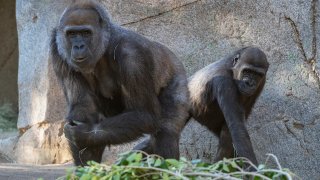
Several gorillas at the San Diego Zoo Safari Park were recovering from the virus which causes COVID-19, zoo officials reported Monday.
Three of the Safari Park's gorillas tested positive for SARS-CoV-2 on Jan. 11, but zoo veterinarians reported Monday that the entire eight-member troop is eating, drinking, interacting and on the way to a full recovery, thanks to the work of wildlife care professionals and collaborations with an array of colleagues and partners who ensured care for the affected primates.
The conservation organization joined forces with more than a dozen local, state and national leaders in the medical, scientific, zoological and public health communities to treat the apes.
"In addition to providing the best care possible for the gorilla troop, this ongoing teamwork could contribute to a deeper understanding of the impacts of this virus on animals and people worldwide," a zoo statement read.
Photos: San Diego Zoo Safari Park Gorilla Troop Recovering From COVID-19 Scare
Those colleagues include professionals from the San Diego County Health and Human Services Agency, UC San Diego Health, Rady Children's Hospital, Scripps Research Institute and multiple state, federal and Illinois- and Georgia-based zoological organizations.
Local
The gorillas were infected with the B.1.429 lineage of the coronavirus, which has been increasingly identified in California and may be more contagious than other strains. The entire troop has remained under close observation since the diagnosis -- when some of the gorillas showed symptoms including mild coughing, congestion, nasal discharge and intermittent lethargy.
The silverback, Winston, whose symptoms included a cough and lethary, underwent a diagnostic examination under anesthesia due to his advanced age and a concern for underlying medical conditions. Veterinarians confirmed pneumonia and heart disease.
Following consultation with specialists, treatment was initiated, including heart medications, antibiotics and monoclonal antibody therapy. The antibody therapy originated from a supply that was not permitted for human use.
Treatment with the synthetic versions of the body's natural defenses is thought to be effective in diminishing effects from the virus. The veterinary team that treated Winston believe the antibodies may have contributed to his ability to overcome the virus, according to a zoo statement.
The network of collaborators has also provided San Diego Zoo Global veterinarians with a limited supply of a recombinant purified spike protein vaccine, intended for use in protecting animals against SARS-CoV-2. The vaccine doses originated from a supply strictly intended for non-human use, according to the zoo.
The zoo's leadership recognizes the documentation of the virus in gorillas at the Safari Park may provide important information regarding scientific understanding of the virus and its effects on great apes. The organization pledged to continue to share what it has learned about curbing disease transmission, biosecurity protocols in managed care and field settings and ensuring optimal health outcomes for humans and wildlife globally.
The work of San Diego Zoo Global includes on-site wildlife conservation efforts at the San Diego Zoo, San Diego Zoo Safari Park, and San Diego Zoo Institute for Conservation Research, as well as international field programs on six continents.



